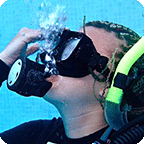 Those of us who teach scuba know all about That Student. You know the one. He or she is a likable person, and it’s clear this person really wants to dive. Overall, his or her skills aren’t absolutely horrible. But there is that one skill (as often as not it’s mask clearing) which has this person absolutely stymied.
Those of us who teach scuba know all about That Student. You know the one. He or she is a likable person, and it’s clear this person really wants to dive. Overall, his or her skills aren’t absolutely horrible. But there is that one skill (as often as not it’s mask clearing) which has this person absolutely stymied.
And so the student struggles. And struggles, soldiering on through the rest of the course while this one skill hangs over his or her head like the Sword of Damocles. Finally, after repeated attempts, the student manages to remove his or her mask without bolting to the surface and, somehow, gets it back in place and clears it.
Understand, you like this person. You admire his or her persistence. In your heart, you want this student to succeed. So, when he or she finally muddles through the problem skill, it’s perfectly understandable to give in to the temptation to say, “Okay. You pass.”
Don’t do it.
Don’t do it because, if you do, you’re not really doing the student any favors. And, if you really care about this person, don’t simply reward effort. Reward actual achievement.
Consider the consequences of failing to do so. After managing to remove, replace and clear a mask with limited success, once, you allow the student to progress to open water. Then, during the first dive, the student gets some water in his or her mask. Faced with the added stress of deeper, darker, colder water, and the added task load of a thicker wet suit and more weight, the student’s response is to panic and bolt. Unfortunately, when he or she does, the student also forgets to continue breathing.
During the wrongful death suit that follows, the plaintiff’s attorney starts asking very pointed and uncomfortable questions about just how truly ready the student was for open water. The good news is, your insurance company will ease the financial burden of the inevitable settlement. That’s the easy part.
The hard part comes when you have to face the family, your fellow instructors and your students. It comes when you have to look in the mirror every morning, knowing that looking back at you is the person who is ultimately responsible for the student’s death.
I’ve seen instructors have to deal with this. It ain’t worth it.
Benchmarks for Real Achievement
As you’ve seen, no matter how tempting, you can’t afford to simply reward effort. You can only reward actual achievement. How do you do that?
The various training agencies have their own definitions of terms such as mastery and competency. Here is the one we use.
To say that a student has truly “mastered” a particular skill, he or she must be able to do so:
- On demand
- Repeatedly
- Without significant error
- Without undue stress
In other words:
- When you signal a student to perform the skill, he or she is able to do so immediately, without first having to psych themselves up.
- If you ask the student to perform the skill a second time, or a third, he or she doesn’t need to take a minute to recover from the psychological trauma of having done it the first time.
- No one expects a beginning student to perform skills with the same level of perfection as an instructor. However, the student’s performance should not be a total cluster.
- Finally, although your student doesn’t necessarily need to like doing a particular skill, the experience should not be so traumatic as to require therapy later.
Remember that it is never sufficient for a student to perform a core skill such as mask clearing, regulator recovery and clearing, real buoyancy control or gas sharing once. Students have to perform these skills repeatedly for real learning to take place,
Empathy for your students is the mark of a good instructor. Just don’t allow that empathy to give students a pass on a skill that may be critical to their survival.
